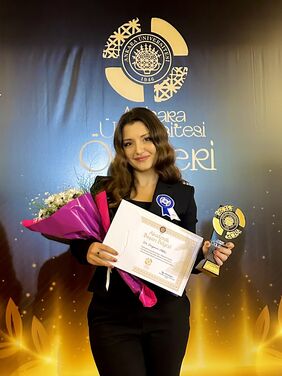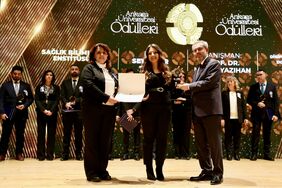Can you tell us what this award is about and why you were selected for it?
This award recognizes academic excellence during the PhD period. I completed my PhD under the supervision of Prof. Dr. Nuray Yazıhan at Ankara University, Institute of Health Sciences; Food, Metabolism, and Clinical Nutrition Department. My PhD focused on metabolism in chronic diseases and the effects of nutrition on health.
I was honored to receive the Interdisciplinary PhD Performance Award from Ankara University. This recognition was based on publications, projects, international traineeships, fellowships, and grants obtained throughout my PhD. I am incredibly proud and grateful to have been selected for this award. I would like to express my heartfelt thanks especially to my supervisor, Prof. Dr. Nuray Yazıhan, all the scientists in my department and our collaborators for their support.
Can you recall a significant moment during your PhD journey that led to this recognition?
Rather than a single moment, I believe this award reflects the cumulative effort of my entire PhD journey, where each step built upon the previous one.
After completing my master's degree, I was awarded the Council of Higher Education (YÖK) 100/2000 “Priority Field” Fellowship for my PhD research on metabolism and chronic diseases. During that early period, I had a couple of publications and gained international experience through Erasmus traineeships at the University of St. Andrews, UK and the Charles University, Czechia. This led to my selection for the Scientific and Technological Research Council of Türkiye (TÜBİTAK) Double Success PhD Fellowship alongside with YÖK fellowship. These fellowships provided funding for me to conduct research abroad related to my thesis on amino acid profiles in neurodegenerative and brain-related disorders.
Through this opportunity, I met Dr. Clara Correia-Melo, my current group leader. Together, we applied for and received the FEBS Short-Term Fellowship, which allowed me to work at the Leibniz Institute on Aging – Fritz Lipmann Institute (FLI). This experience not only led to the recognition of this award but was also pivotal in shaping my future research direction and my postdoctoral position at FLI.
How did you feel when you found out you had won this award?
I was incredibly proud! Every PhD student knows that this journey can be challenging, filled with uncertainties and moments of doubt. But when we finally defend our theses, all the hard work pays off. I officially received my PhD on June 26, 2024, and a few months later, I learned that I had also been awarded the PhD Performance Award. It truly felt like the cherry on top of an already rewarding journey!
What inspired you to pursue a career in research?
For me, it is driven by deep curiosity. This curiosity keeps me motivated, even when experiments fail, or results seem unclear. I always wonder what I will see next on this long path, and that fuels my passion for science (well, most of the time! ????).
You are currently working at our institute. Can you tell us about your research here?
Yes! My project focuses on the metabolic crosstalk between brain cells during aging and neurodegeneration. I work with induced pluripotent stem cell (iPSC)-derived brain cells, a technique I first learned here at FLI during my PhD internship. Now, as a postdoc, I am expanding this work to explore how different brain cells interact chemically and how these interactions change with age.
What do you enjoy most about working at our institute? What makes it a special place for research?
There are many things I enjoy a lot about working at FLI, but I would say the collaborative environment and strong and sincere support stand out the most.
During my internship, Clara was incredibly supportive, and together, we developed exciting research ideas that have now shaped my postdoctoral work. She continues to support and guide me, giving me the best opportunity to develop my skills and create my path as an early career postdoc. Additionally, I learned new techniques with the support of many great people from different labs and facilities at FLI. Having this level of mentorship and collaboration makes FLI a fantastic place to work, which is exactly what a young researcher needs.
How have your background and previous research experiences influenced your work here?
My academic journey has been quite interdisciplinary, significantly shaping my research approach.
I earned my Bachelor’s degree in Nutrition and Dietetics, followed by a Master’s degree at Ankara University’s Food, Metabolism, and Clinical Nutrition Department. This program brought together experts from medicine, pharmacy, nutrition, food engineering, and even agricultural sciences, giving me a broad perspective on metabolism in chronic diseases in my case. Later, in my PhD, I participated in many different clinical studies focusing on the effects of nutrition and metabolism on health. Eventually, I realized my strongest interest was in neurodegeneration and brain disorders, leading to my PhD thesis on this topic.
Alongside lab work, I also trained in meta-analysis studies since my Master’s, and I was aware of their high value in scientific evidence. This helped me develop strong analytical skills and a critical perspective on existing literature. When I joined Clara’s lab, I was introduced to high throughput approaches and mostly focused on chemical interactions between cells.
Now, in my postdoc, I can integrate both: conducting cutting-edge experiments in high-throughput scale and critically analyzing the data. I firmly believe that in science, performing great experiments is not enough; analysis, interpretation, and contextualization within the broader scientific landscape are essential. Without this full-circle approach, scientific progress will remain incomplete.
The award you received recognizes interdisciplinary research. What does working in a multidisciplinary environment mean to you?
Having spent my entire academic background in interdisciplinary environments, I can't imagine research without collaboration across different fields.
Working with scientists from diverse backgrounds allows me to see the bigger picture and prevents me from getting stuck on just one small piece of the puzzle. In today’s fast-paced research landscape, we cannot and should not work in isolated silos for sure. To truly push the boundaries of knowledge, we need to integrate perspectives, techniques, and expertise from multiple disciplines, I think.
What are your future goals in research?
As a new postdoc, I know there’s still a long road ahead! My primary goal is to deepen our understanding of the chemical signatures of brain aging and the metabolic dialogues between brain cells. I will also contribute to studies incorporating gut-brain interactions in our lab together with our collaborators. Our cells are engaged in a fascinating biochemical conversation, and I really want to listen what they are saying.










